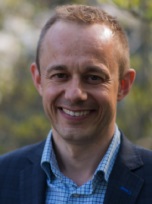Senior Researcher at DRCMR and Associate Professor at DTU Compute, Tim Dyrby receives a 1.9 million DKK grant from "VILLUM Experiment" - an experimental grant which supports unorthodox ideas in their early phase.

Tim Dyrby will conduct his study on 3D reconstructions of the neural connections in the mice brain at DTU Compute. The brain ensures body functions, cognitive abilities, and reactions to sensory inputs in our daily lives. The key to normal brain function is the physiology of signalling between brain regions that are functionally connected in the brain network. Anatomically, a brain connection is comprised of a bundle of axons, almost like electrical cables, but only a few micrometres in diameter. Any failure to the brain network can introduce an imbalance in brain physiology and lead to disability, cognitive dysfunction, lifestyle diseases, etc. Today, only a single brain connection can be imaged at a time when investigating the brain network. In this "VILLUM Experiment"-supported project, we will explore a new laser-based imaging contrast. This technique uniquely holds the potential for mapping all brain connections of the intact mouse brain in 3D - uniquely, in a micrometre image resolution.
The "VILLUM Experiment" is a new way of funding research. VILLIM FONDEN explains the launch of the programme with the need for a programme which can support unorthodox ideas already in their early phase - even before one knows if the idea can break new grounds in the technical and natural sciences. Such untraditional ideas migh be excluded by the traditional funding schemes, because the process of these schemes tend to disregard a certain class of breakthrough ideas that are unripe, too risky and even naive at first glance. Therefore, according to the VILLUM FONDEN: "the Villum Experiment is for the bold and radical new research ideas that have difficulty fitting into the conventional peer-review funding system" and operates within curiosity-driven research. To ensure unconventional ideas, the applicants are completely anonymous to their reviewers.
Read more about Tim Dyrby and his research group Microstructure and Plasticity.


